Cement Industry
AI supported kiln audit with disaster detection for the cement industry

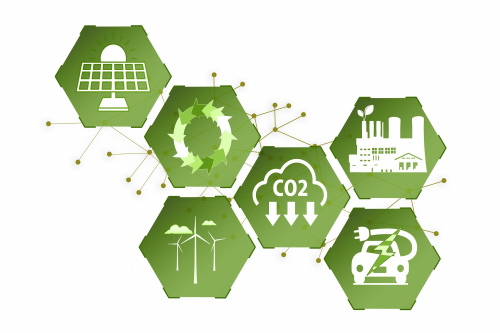
Motivation
Cement production is a major CO2 emitter for production reasons due to high fuel consumption and decarbonization of the limestone and is therefore a major topic in the current discussion on decarbonization. There are concrete plans and projects by scientists and industry to reduce CO2 emissions through CO2 capture and subsequent storage or conversion, but this approach is currently only being tested in pilot plants.
Our approach aims to optimize the existing process through permanent monitoring of significant key figures, so that production losses (kiln downtime) are minimized and the raw materials / fuels used are used optimally. The ROI is easy to represent, since on the one hand an uninterrupted, stable combustion process (apart from maintenance work) and a CO2 reduction are achieved.
Process optimization is achieved by calculating relevant key figures and using machine learning methods that map the complexity (chemical composition of the starting materials, technical design of the system, parameter settings such as burners, air supply, ...) in a model that subsequently creates a forecast of the kiln run allowed.
The product web-pdp
The research project "Kiln Rescue" (research partner Consulting Engineering Jedlitschka) which is the base of the product "web-pdp" is a cloud solution that offers a permanent hourly kiln audit.
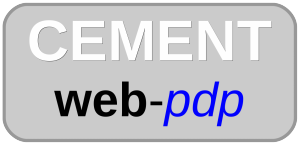
With an hourly system audit, in which a balance of the masses, critical elements and energy flows etc. and system parameters are created, comparisons with the history of your own system and with other companies are made possible. The result is used to detect weak points in the operational management or in the system technology.
A prognosis tool for kiln failures (such as ring formation or ball formation) and cyclone failures (cyclone blockages) is available as an add-on. With 24/7 monitoring, critical situations can be identified in good time and a proactive response can be made to ensure an uninterrupted burning process. Various physical and chemical parameters as well as calculations based on them can be displayed easily and clearly directly in the web browser.
The basic version of web-pdp contains the following information pages:
- General: Summary of the essential parameters to get a quick overview of the functionality
- Mass balance: The main mass flows as the mass flows of individual elements (S, alkalis)
- Heat balance: thermal energy inputs, losses through radiation, exhaust gases and material outlets are compared in tabular form
- Chemism: real and extrapolated analyzes are compared, indices of flammability, build-up behavior and uniformity are determined.
- Plant engineering: Indicators of individual plant efficiencies, burner and cooler functionality are reported.
- Emissions and gas flows: A combustion calculation provides the basis for comparison with emission measurements or volume flow measurements.
- Kiln run forecast: disaster detection for kiln and cyclone (add-on/additional product)
- Analysis Tool: Time series statistics analysis tool
- Operations diary: A continuous monitoring and presentation of events.
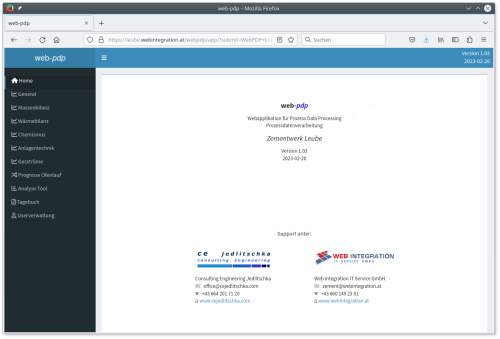
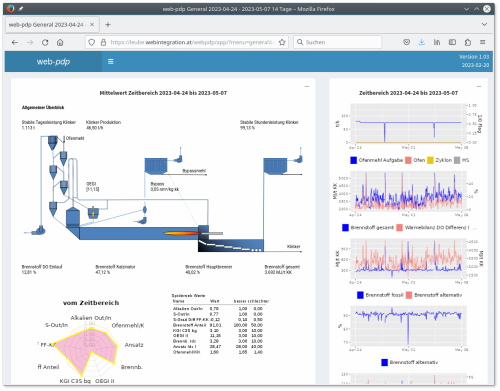
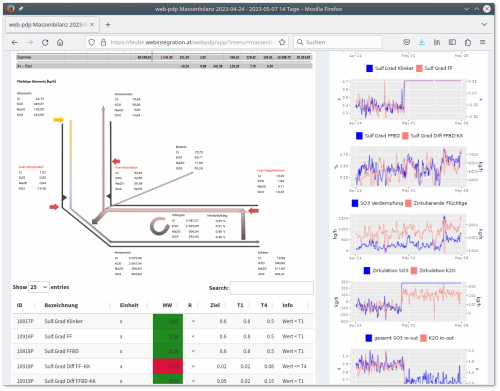
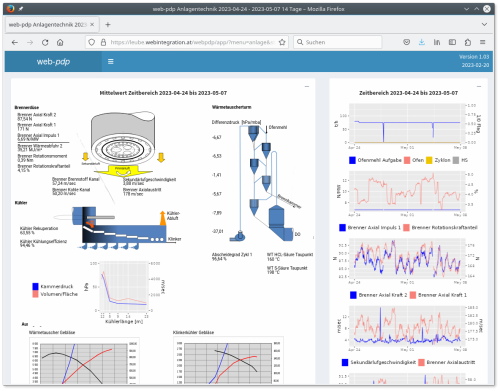
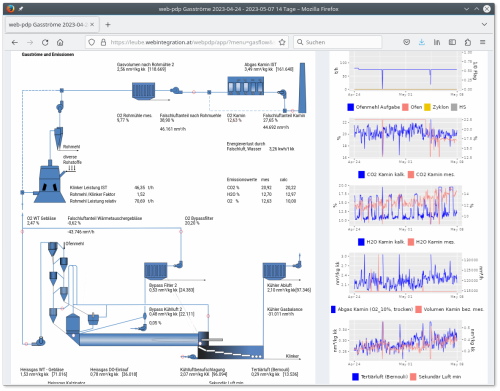
Further information pages with statistical data, forecasts and additional evaluations, can be supplemented at any time in the form of add-ons.

Diary and Machine Learning
Plant-relevant information as well as events such as kiln failure, ring formation, ball formation, cyclone tampers, technical defects, etc. can be noted in a diary. A unique event class can be assigned to each diary entry, which influences the forecast model for disaster detection. Using machine learning and multivariate time series analysis of selected hourly factory data, the forecast models can be continuously improved and adapted to new tasks. The methods used are based on AI algorithms, artificial intelligence.
Ihre Vorteile
Using web-pdp gives you the following advantages:
- Daily kiln audit based on hourly data
- Extensive statistical evaluations
- Additional calculations adapted to your plant
- Disaster detection for kiln and cyclone failures
- Possibility of expansion with further evaluations adapted to your plant
- Optimized use of alternative fuels
- Reduction of downtimes
- CO2 reduction in cement production
- Opportunities for optimization based on the statistical data provided
- Increased efficiency and cost savings


For more information and an offer adapted to your plant, please contact us at:
- DI. Christian Erhart
- through our contact form (Contact)
- by email at office@webintegration.at
- by phone at +43 664 1492381
- responsible for: IT environment, cloud solution, AI and machine learning
Or our partner, Consulting Engineering Jedlitschka (CE Jedlitschka), at:
- DI. Bernhard Jedlitschka
- by email at office@cejedlitschka.com
- by phone at +43 664 2017120
- www.cejedlitschka.com
- responsible for: Kiln Audit and Process Integration

